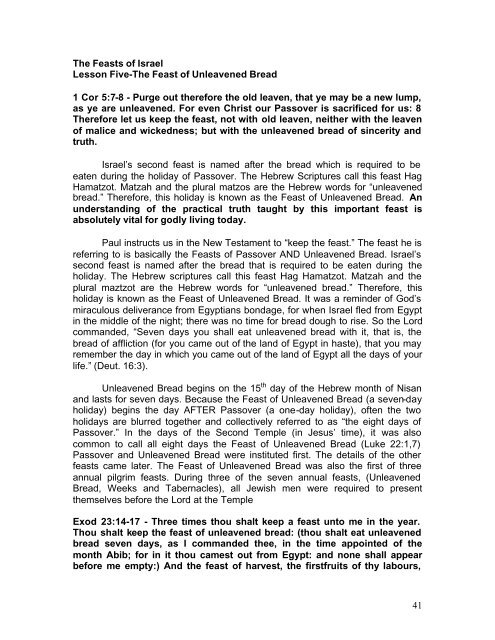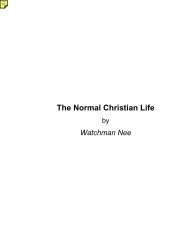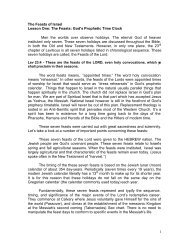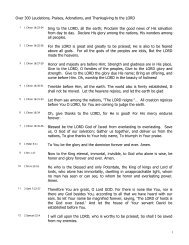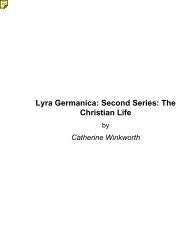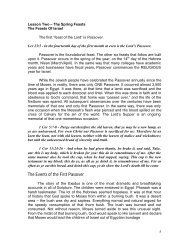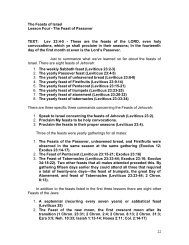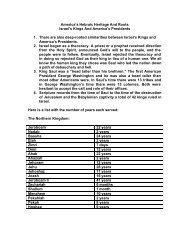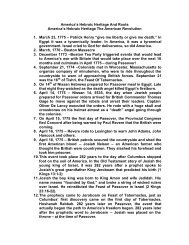Lesson 5-The Feast of Unleavened Bread - Threemacs.org
Lesson 5-The Feast of Unleavened Bread - Threemacs.org
Lesson 5-The Feast of Unleavened Bread - Threemacs.org
You also want an ePaper? Increase the reach of your titles
YUMPU automatically turns print PDFs into web optimized ePapers that Google loves.
ead, until the one and twentieth day <strong>of</strong> the month at even. [19] Sevendays shall there be no leaven found in your houses: for whosoever eateththat which is leavened, even that soul shall be cut <strong>of</strong>f from thecongregation <strong>of</strong> Israel, whether he be a stranger, or born in the land. [20]Ye shall eat nothing leavened; in all your habitations shall ye eatunleavened bread.Exodus 13:6-8 - Seven days thou shalt eat unleavened bread, and in theseventh day shall be a feast to the Lord. [7] <strong>Unleavened</strong> bread shall beeaten seven days; and there shall no leavened bread be seen with thee,neither shall there be leaven seen with thee in all thy quarters. [8] And thoushalt shew thy son in that day, saying, This is done because <strong>of</strong> that whichthe Lord did unto me when I came forth out <strong>of</strong> Egypt.Exodus 23:15 - Thou shalt keep the feast <strong>of</strong> unleavened bread: (thou shalteat unleavened bread seven days, as I commanded thee, in the timeappointed <strong>of</strong> the month Abib; for in it thou camest out from Egypt: andnone shall appear before me empty:)Exodus 34:18 - <strong>The</strong> feast <strong>of</strong> unleavened bread shalt thou keep. Seven daysthou shalt eat unleavened bread, as I commanded thee, in the time <strong>of</strong> themonth Abib: for in the month Abib thou camest out from Egypt.Leviticus 23:6 - And on the fifteenth day <strong>of</strong> the same month is the feast <strong>of</strong>unleavened bread unto the Lord: seven days ye must eat unleavenedbread.Deut. 16:3 - Thou shalt eat no leavened bread with it; seven days shalt thoueat unleavened bread therewith, even the bread <strong>of</strong> affliction; for thoucamest forth out <strong>of</strong> the land <strong>of</strong> Egypt in haste: that thou mayest rememberthe day when thou camest forth out <strong>of</strong> the land <strong>of</strong> Egypt all the days <strong>of</strong> thylife.Deut. 16:8 - Six days thou shalt eat unleavened bread: and on the seventhday shall be a solemn assembly to the Lord thy God: thou shalt do no worktherein.Not only is the eating <strong>of</strong> leavened foods (such as bread and rolls) forbiddenduring the feast, but even the presence <strong>of</strong> leaven within one’s house is unlawful.<strong>The</strong> Lord commanded Moses, “Seven days you shall eat unleavened bread. Onthe first day you shall remove leaven FROM YOUR HOUSES. For whosoevereats leavened bread from the first day until the seventh day, that person shall becut <strong>of</strong>f from Israel.” (Exodus 12:15) Disobedience to the divine command carriedthe death penalty. Another command stated, “<strong>Unleavened</strong> bread shall be eatenSEVEN days. And NO LEAVENED bread shall be seen among you, nor shallleaven be seen among you in ALL YOUR QUARTERS.” (Ex. 13:7). <strong>The</strong> extent <strong>of</strong>44
Another key fact surrounding Messiah’s burial was the fact His body didnot return to dust. King David prophesied <strong>of</strong> the Messiah:Psalm 16:10 - For thou wilt not leave my soul in hell; neither wilt thousuffer thine Holy One to see corruption.Obviously, David did not prophesy this about himself. His grave has been arevered site in Jerusalem for nearly 3,000 years. David’s body DID DECAY (ashas the body <strong>of</strong> every other person who has died in history), but the Messiah’sbody DID NOT DECAY! <strong>The</strong> sons <strong>of</strong> Adam were SINNERS under the divinecurse: “To dust you shall return.” (Gen. 3:19). As a pure, sinless sacrifice, theMessiah was not under the curse to return to dust. <strong>The</strong>refore, the Messiah cameforth from the grave on the third day after he had carried our sins far away!Psalm 103:12 - As far as the east is from the west, so far hath he removedour transgressions from us.Hebrews 9:26 - For then must he <strong>of</strong>ten have suffered since the foundation<strong>of</strong> the world: but now once in the end <strong>of</strong> the world hath he appeared to putaway sin by the sacrifice <strong>of</strong> himself.<strong>The</strong> Messiah fulfilled the <strong>Feast</strong> <strong>of</strong> <strong>Unleavened</strong> <strong>Bread</strong> in that He was aPURE, SINLESS (WITHOUT LEAVEN) sacrifice. God validated this by theMessiah’s burial in a rich man’s tomb. Furthermore, the body <strong>of</strong> the Messiah wasnot permitted to decay in the grave (like dough soured by leaven), but wasbrought forth because He was not a sinner under the curse <strong>of</strong> death and decay.<strong>The</strong> <strong>Feast</strong> and <strong>The</strong> New Testament Believer TodayPaul embraced the <strong>Feast</strong> <strong>of</strong> <strong>Unleavened</strong> <strong>Bread</strong> in his exhortation to theCorinthians.1 Cor. 5:5-8 - To deliver such an one unto Satan for the destruction <strong>of</strong> theflesh, that the spirit may be saved in the day <strong>of</strong> the Lord Jesus. [6] Yourglorying is not good. Know ye not that a little leaven leaveneth the wholelump? [7] Purge out therefore the old leaven, that ye may be a new lump, asye are unleavened. For even Christ our Passover is sacrificed for us: [8]<strong>The</strong>refore let us keep the feast, not with old leaven, neither with the leaven<strong>of</strong> malice and wickedness; but with the unleavened bread <strong>of</strong> sincerity andtruth.Paul’s message is simple and direct. For believers who have, by faith,accepted the sacrifice <strong>of</strong> the Passover Lamb at Calvary, Passover is past history.<strong>The</strong> deliverance <strong>of</strong> the Messiah, the true Passover Lamb, has already beenexperienced in their lives. <strong>The</strong>y are now living in the <strong>Feast</strong> <strong>of</strong> <strong>Unleavened</strong> <strong>Bread</strong>where purity and separation from LEAVEN is required. Paul expressed shock47
and dismay that the Corinthian believers were still partaking <strong>of</strong> their old sins. Itdoes no good to simply get rid <strong>of</strong> the large conspicuous loaves on the table andleave the little pieces <strong>of</strong> leaven scattered on the floor. A little leaven willcontaminate everything else.Verse 6- Your glorying is not good. Know ye not that a little leavenleaveneth the whole lump?Paul is basically saying this: “How can you enter into the <strong>Feast</strong> <strong>of</strong><strong>Unleavened</strong> <strong>Bread</strong> still eating your leavened bread? It is not kosher. It does notbelong. <strong>The</strong> two do not go together. It is an outrage! Get rid <strong>of</strong> it! Paul is simplystating what he had written to the church at Rome. In Romans chapter 6 hestated the believer was NO LONGER under the power (dominion) <strong>of</strong> sin – it hasbeen broken. <strong>The</strong> believer is no longer a helpless slave to sin but ratherCHOOSES sin when he is drawn away by his own lust (James 1:14-15)James 1:14-15 - But every man is tempted, when he is drawn away <strong>of</strong> hisown lust, and enticed. [15] <strong>The</strong>n when lust hath conceived, it bringeth forthsin: and sin, when it is finished, bringeth forth death.Romans 6:1-18 - What shall we say then? Shall we continue in sin, thatgrace may abound? [2] God forbid. How shall we, that are dead to sin, liveany longer therein? [3] Know ye not, that so many <strong>of</strong> us as were baptizedinto Jesus Christ were baptized into his death? [4] <strong>The</strong>refore we are buriedwith him by baptism into death: that like as Christ was raised up from thedead by the glory <strong>of</strong> the Father, even so we also should walk in newness <strong>of</strong>life. [5] For if we have been planted together in the likeness <strong>of</strong> his death, weshall be also in the likeness <strong>of</strong> his resurrection: [6] Knowing this, that ourold man is crucified with him, that the body <strong>of</strong> sin might be destroyed, thathenceforth we should not serve sin. [7] For he that is dead is freed fromsin. [8] Now if we be dead with Christ, we believe that we shall also live withhim: [9] Knowing that Christ being raised from the dead dieth no more;death hath no more dominion over him. [10] For in that he died, he diedunto sin once: but in that he liveth, he liveth unto God. [11] Likewise reckonye also yourselves to be dead indeed unto sin, but alive unto God throughJesus Christ our Lord. [12] Let not sin therefore reign in your mortal body,that ye should obey it in the lusts there<strong>of</strong>. [13] Neither yield ye yourmembers as instruments <strong>of</strong> unrighteousness unto sin: but yield yourselvesunto God, as those that are alive from the dead, and your members asinstruments <strong>of</strong> righteousness unto God. [14] For sin shall not havedominion over you: for ye are not under the law, but under grace. [15] Whatthen? shall we sin, because we are not under the law, but under grace?God forbid. [16] Know ye not, that to whom ye yield yourselves servants toobey, his servants ye are to whom ye obey; whether <strong>of</strong> sin unto death, or <strong>of</strong>obedience unto righteousness? [17] But God be thanked, that ye were theservants <strong>of</strong> sin, but ye have obeyed from the heart that form <strong>of</strong> doctrine48
which was delivered you. [18] Being then made free from sin, ye becamethe servants <strong>of</strong> righteousness.<strong>The</strong> tragedy is far too believers realize this truth. <strong>The</strong>y continue to beduped by the flesh into thinking and acting as if sin is still the evil taskmaster theyare obligated to obey. In God’s sight we are now UNLEAVENED BREAD(Justified and Pure) and are called to lives <strong>of</strong> holiness. Paul just asks, “Why areyou living like you are not?”<strong>The</strong> presence <strong>of</strong> any leaven during Passover and the <strong>Feast</strong> <strong>of</strong> <strong>Unleavened</strong><strong>Bread</strong> is an absolute outrage. Even the mere sight <strong>of</strong> it is a very serious matter.Just as is done in the purging ceremony <strong>of</strong> the house during the typical feast, weneed to thoroughly sweep out our lives. We need to take the candle <strong>of</strong> God’sword and let is crucify us. We need the Holy Spirit to search out our lives andlook at every corner, every crack, and every window <strong>of</strong> our heart. <strong>The</strong> task is notcompleted until EVERY ounce <strong>of</strong> leaven is removed from our lives. “For indeed,Christ our Passover is sacrificed for us.” Let us keep the <strong>Feast</strong>!!!!!<strong>The</strong> Doctrine <strong>of</strong> Sanctification in Scripture1 Cor. 1:30 - But <strong>of</strong> him are ye in Christ Jesus, who <strong>of</strong> God is made unto uswisdom, and righteousness, and sanctification, and redemption:1 <strong>The</strong>s. 4:3-4 - For this is the will <strong>of</strong> God, even your sanctification, that yeshould abstain from fornication: [4] That every one <strong>of</strong> you should knowhow to possess his vessel in sanctification and honour;2 <strong>The</strong>s. 2:13 - But we are bound to give thanks alway to God for you,brethren beloved <strong>of</strong> the Lord, because God hath from the beginning chosenyou to salvation through sanctification <strong>of</strong> the Spirit and belief <strong>of</strong> the truth:1 Peter 1:2 - Elect according to the foreknowledge <strong>of</strong> God the Father,through sanctification <strong>of</strong> the Spirit, unto obedience and sprinkling <strong>of</strong> theblood <strong>of</strong> Jesus Christ: Grace unto you, and peace, be multiplied.Paul wrote to the church at <strong>The</strong>ssalonica that God had “chosen” them tosalvation. God's choice is to salvation through:1.Sanctification <strong>of</strong> the Spirit2.Belief <strong>of</strong> the truth49
No man can receive salvation except through these two things. It is folly toclaim salvation without sanctification and belief in the truth. See note, John17:17.<strong>The</strong> word “sanctification,” which is basically the process <strong>of</strong> being cleanfrom leaven, comes from the Greek: ????????? (GSN-38),which means aconsecration; a separation unto God FROM a pr<strong>of</strong>ane, secular, and carnal useTO a sacred, religious, and spiritual use. <strong>The</strong> words "sanctify" and "sanctified"are used 132 times; "sanctification" 5 times (New Testament only); and"sanctifieth" 4 times (New Testament only)—141 times total in Scripture: 110times in the Old Testament and only 31 times in the New Testament A study <strong>of</strong>the various passages shows that to sanctify means to set apart from other usesto God's particular use, not to cleanse from sin or rid <strong>of</strong> carnal nature (sometimescalled "the old man" or Adamic nature). Even Christ, the Sinless One, wassanctified (John 10:36; John 17:19). Where humans are concerned one beginsto be sanctified when he begins to consecrate his life to God, and the process iscontinued as he continues in his dedication (1 Cor. 1:30; 1 Cor. 6:11; 2 <strong>The</strong>s.2:13; 1 John 1:7-9; 1 John 3:8-10; 1 John 5:1-4,18). Sin is not necessarilyinvolved in sanctification, because the word means setting apart. God hassanctified both people and material things, and even immaterial things. If sin isnot involved in the person or thing set apart, then no sin is cleansed in theprocess <strong>of</strong> setting apart.However, if sin and filth are involved in a person or a material thing to beset apart unto God, then such must be dealt with to make it presentable to God.<strong>The</strong>re are SEVEN personal agents used in sanctifying:• God (Genesis 2:3; Leviticus 21:15,23; Leviticus 22:9; John 10:36; 1<strong>The</strong>s. 5:23; Jude 1:1)• Jesus Christ (1 Cor. 1:30; Ephes. 5:26; Hebrews 2:11; Hebrews10:10,14; Hebrews13:12)• Holy Spirit (Romans 15:16; 1 Cor. 6:11; 2 <strong>The</strong>s. 2:13; 1 Peter 1:2)• Moses (Exodus 19:10,14; Exodus 40:13; Leviticus 8:10-15,30;Leviticus 21:8; Numbers 7:1)• Joshua (Joshua 7:13)• Priests (1 Chron. 15:14; 2 Chron. 30:24; Exodus 19:22)• Laymen (Leviticus 11:44; Leviticus 20:7). Cp. Matthew 23:17,19;Hebrews 9:13Man is the agent in sanctification 85 times; God 23 times; Christ 10 times;and the Holy Spirit 4 times. Man has as much to do with sanctification as God, forhe is the one who decides to sanctify himself to God. Man and God worktogether in the setting apart process. Men are spoken <strong>of</strong> as being sanctified 75times; material things are said to be sanctified 40 times; and God is referred to asbeing sanctified 14 times (Leviticus 10:3; Numbers 20:12-13; Numbers 27:14;50
Isaiah 5:16; Isaiah 8:13; Isaiah 29:23; Ezekiel 20:41; Ezekiel 28:22,25; Ezekiel36:23; Ezekiel 38:16; Ezekiel 39:27).<strong>The</strong> Bible gives us 15 commands to sanctify ourselves or PURGE OUT THELEAVEN in our lives:1. Let priests sanctify themselves (Exodus 19:22; 1 Chron. 15:14; 2Chron. 29:15,34; 2 Chron. 30:3,5,15,24; 2 Chron. 31:18).2. Sanctify them (Exodus 19:10; Exodus 28:41; Exodus 29:33;Exodus 30:29; Leviticus 8:11; Leviticus 21:23).3. Sanctify him (Leviticus 8:12; Leviticus 21:8,15).4. Sanctify yourselves (Leviticus 20:7; Numbers 11:18; Joshua 3:5; 1Samuel 16:5; 1 Chron. 15:12; 2 Chron. 29:5).5. Sanctify the people (Exodus 19:14; Joshua 7:13).6. Sanctify Aaron and his garments (Leviticus 8:30).7. Sanctify unto Me all the firstborn (Exodus 13:2).8. Sanctify it (mountain, Exodus 19:23).9. Sanctify the breast (<strong>of</strong> wave <strong>of</strong>fering, Exodus 29:27).10. Sanctify the altar (Exodus 29:36-37; Exodus 40:10).11. Sanctify the Lord <strong>of</strong> Hosts (Isaiah 8:13).12. Sanctify the Holy One <strong>of</strong> Jacob (Isaiah 29:23).13. Sanctify a fast (Joel 1:14; Joel 2:15).14. Sanctify the congregation (Joel 2:18).15. Sanctify the Lord God in your hearts (1 Peter 3:15)<strong>The</strong>re is also progressive sanctification and complete sanctification. Thussanctification is all three- INSTANTANEOUS, PROGRESSIVE and COMPLETE.Wesley cried, “Sanctify me wholly.” <strong>The</strong>re are Biblical pro<strong>of</strong>s <strong>of</strong> progressivesanctification:1. Statements <strong>of</strong> Jesus (Luke 9:23; John 8:31; John 14:26; John 15:3;John 16:13-16)2. Statements <strong>of</strong> Luke (Acts 13:43; Acts 14:22; Acts 15:41; Acts 16:5;Acts 18:26)3. Statements <strong>of</strong> Paul (Romans 1:11,17; Romans 2:7; Romans 4:12;Romans 6:3-22; Romans 7:4-6; Romans 8:1-13; Romans 11:20-22;Romans 12:1-21; Romans 14:19; 1 Cor. 1:7-10; 1 Cor. 11:31-34; 1Cor. 15:58; 1 Cor. 16:13; 2 Cor. 3:18; 2 Cor. 5:9; 2Cor. 7:1; 2 Cor. 10:4-6; 2 Cor. 13:11; Galatians 5:1,13,16-26; Ephes.3:16-21; Ephes. 4:1-32; Ephes. 5:1-18; Ephes. 6:1-18; Phil. 1:6,9,25-27; Phil. 2:12-15; Phil. 3:7-15; Phil. 4:8-9; Col. 1:9-29; Col. 2:3-9; Col.3:1-17; Col. 4:12; 1 <strong>The</strong>s. 2:2-13; 1 <strong>The</strong>s.3:1-12; 1 <strong>The</strong>s. 5:11-23; 2 <strong>The</strong>s. 1:3-5; 2 <strong>The</strong>s. 2:13-17; 2 <strong>The</strong>s. 3:3; 1Tim. 1:18; 1 Tim. 4:12-16; 1 Tim. 5:21-22; 1 Tim. 6:12-14; 2 Tim. 1:13-14; 2 Tim. 2:4,19-26; Titus 2:7-14; Hebrews 3:6,12-14; Hebrews 4:11;51
Hebrews 5:11-14; Hebrews 6:1- 2,11-12; Hebrews 10:23-39; Hebrews12:12; Hebrews 13:20-21)4. Statements <strong>of</strong> James (James 1:3-4,12,22-27; James 2:14-26; James3:2; James 4:4- 10; James 5:1-12)5. Statements <strong>of</strong> Peter (1 Peter 1:5-16; 1 Peter 2:1-12; 1 Peter 3:8-12; 1Peter 4:1-19; 1 Peter 5:1-10; 2 Peter 1:4-10; 2 Peter 3:14-18)6. Statements <strong>of</strong> John (1 John 1:6-9; 1 John 2:1-6,24-29; 1 John 3:1-10;1 John 5:1-18; 2 John 1:1,6,8; 3 John 1:4,11)7. Statements <strong>of</strong> Jude (Jude 1:3,20-24)<strong>The</strong>re are also pro<strong>of</strong>s <strong>of</strong> complete sanctification in scripture:1. Statements <strong>of</strong> Jesus (Matthew 10:22; Matthew 19:27-29; Matthew25:46; Mark 10:29-30; Luke 21:36; John 4:36; John 6:27; John 12:25;John 14:1-3)2. Statements <strong>of</strong> Paul (Acts 26:18; Romans 2:7-10; Romans 5:21;Romans 6:22-23; Romans 8:17-18,23-25; Romans 13:11; 1 Cor. 1:7-8;1 Cor. 15:1-6,23,51-58; 2 Cor. 4:16-18; 2 Cor. 5:9; Galatians 6:7-8;Ephes. 1:4,13-14; Ephes. 4:13-16; Ephes. 5:26-27; Phil. 1:6; Phil. 3:7-14,20-21; Col. 3:4; 1 <strong>The</strong>s. 1:10; 1 <strong>The</strong>s. 2:19; 1<strong>The</strong>s. 3:13; 1 <strong>The</strong>s. 4:13-18; 1 <strong>The</strong>s. 5:23; Hebrews 3:6,12-14;Hebrews 6:1-12,18-19; Hebrews 10:23,35-39)3. Statements <strong>of</strong> others (James 5:7; 1 Peter 1:3-13; 1 Peter 4:13; 1 Peter5:10; 2 Peter 3:14; John 3:1-3; Jude 1:24-3We are Sanctified Through ChristIn writing to the Corinthians, Paul made it clear that oursanctification was not so much in things we did or did not do, it’s who weembraced. JESUS was made unto us “wisdom, and righteousness, andSANCTIFICATION, and redemption.” In summary, Christ is made five thingsunto us:1. <strong>The</strong> power <strong>of</strong> God (1 Cor. 1:24)2. <strong>The</strong> wisdom <strong>of</strong> God (1 Cor. 1:24,30)3. <strong>The</strong> righteousness <strong>of</strong> God (1 Cor. 1:30)4. <strong>The</strong> holiness <strong>of</strong> God (1 Cor. 1:30)5. <strong>The</strong> redemption <strong>of</strong> God (1 Cor. 1:30)<strong>The</strong>re are actually nine things HE was made for us outside <strong>of</strong> what Paulsaid in Corinthian1. He was made <strong>of</strong> no reputation (Phil. 2:7).2. He was made flesh (John 1:1)3. He was made <strong>of</strong> a woman (Galatians 4:4).4. He was made in likeness <strong>of</strong> man (Phil. 2:7).5. He was made <strong>of</strong> seed <strong>of</strong> David (Romans 1:3)6. He was made lower than angels (Hebrews 2:7)7. He was made under the law (Galatians 4:4).52
8. He was made a curse for us (Galatians 3:13)9. He was made sin for us (2 Cor. 5:21)We are Sanctified Through the TruthJohn 17:17 - Sanctify them through thy truth: thy word is truth.<strong>The</strong> word “sanctify” comes from the Greek word hagiazo (GSN-37), whichmeans to separate from a pr<strong>of</strong>ane to a sacred use; to consecrate self whollyto God and His service. <strong>The</strong> primary meaning is separation, not making holy.It means to make holy only when the person or thing sanctified needs to becleansed from sin or defilement in order to be fit to be separated unto Godand His service. Material things such as a day (Genesis 2:3); the tabernacle(Exodus 29:43-44); clothes (Leviticus 8:30); houses (Leviticus 27:9-29); or thetemple (2 Chron. 7:16-20) must be cleansed from all defilement in order to be fitto be presented to God for His holy uses. God's name (Ezekiel 36:23); God (1Peter 3:15); Christ (John 10:36; John 17:19); or the already cleansed disciples(John 13:10; John 15:3; John 17:2,6,14,16) need not be cleansed from sinSanctification Is Part <strong>of</strong> Our Salvation Process.. 1 Cor. 6:11 And such were some <strong>of</strong> you: but ye are washed, but ye aresanctified, but ye are justified in the name <strong>of</strong> the Lord Jesus, and by theSpirit <strong>of</strong> our God.Paul lists five classes <strong>of</strong> people in 1 Corinthians that were lost beforethey were saved. Such, he said, were “some <strong>of</strong> you.” <strong>The</strong> first five classes <strong>of</strong>1 Cor. 6:9-10 have to do with the worst immoralities imaginable and yet it isdeclared that some <strong>of</strong> their kind are now saved. But, Paul said, “ye are washed,but ye are sanctified, but ye are justified in the name <strong>of</strong> the Lord Jesus, andby the Spirit <strong>of</strong> our God.” This scripture lists the THREE things that save us– being washed, being sanctified and being justifie• Washed. Greek: ??????? (GSN-628), from ??? (GSN-575),away from, and ???? (GSN-3068), to wash the whole being, not apart <strong>of</strong>it. It is used in Acts 22:16 <strong>of</strong> complete washing from sins; not by baptism,but by calling upon the name <strong>of</strong> the Lord, as in Joel 2:32; Acts 2:21;Romans 10:9-14. Here it is used <strong>of</strong> complete washing from the sins <strong>of</strong> 1Cor. 6:9-10 by calling on the name <strong>of</strong> Jesus Christ and by the Holy Spirit(1 Cor. 6:11). <strong>The</strong> Greek: louo without the preposition apo, is used <strong>of</strong>washing from all sins (Rev. 1:5); the whole feet (John 13:10); the wholebody (Acts 9:37; Hebrews 10:22); the whole sow (2 Peter 2:22); and allthe stripes <strong>of</strong> Paul and Silas (Acts 16:33).• Justified. Greek: ??????? (GSN-1344), to declare righteous or notguilty; justify. It is translated "freed from sin" (Romans 6:7); "justifier"(Romans 3:26); "be righteous" (Rev. 22:11); and "justify" 33 times.53
See Seven Facts about Justification. One is justified the moment herepents and is f<strong>org</strong>iven (Luke 18:14; Acts 13:39; Romans 3:24,28,30;Romans 4:5; Romans 5:1,9; 1 Cor. 6:11; Galatians 2:16-17; Galatians3:8,24; Titus 3:5-7).• Sanctified. Greek: ??????? (GSN-37), to hallow, consecrate,separate from sin unto God (note, ? John 17:17). Note how this is putbefore justification (1 Cor. 6:11).<strong>The</strong>re are 10 spiritual pro<strong>of</strong>s when people are justified:1. When they are washed and sanctified (1 Cor. 6:11; 2 Cor. 5:17-18)2. When they repent (Luke 18:13-14)3. When they believe (Acts 13:38-39; Romans 3:24-31; Romans 4:5;Romans 5:1; Galatians 2-3)4. When redeemed (Romans 3:24; Romans 5:9)5. When they partake <strong>of</strong> grace (Romans 3:24-25; Romans 5:1-2; Titus2:11-14; Titus 3:4-7)6. When they accept God's call (Romans 8:30)7. When born again (Titus 3:4-7; 1 John 2:29; 1 John 3:9; 1 John 5:1-4,18; 2 Cor. 5:17- 18)8. When brought to Christ (Galatians 3:24; 2 Cor. 5:17-18; Galatians3:27)9. When reconciled (Romans 5:9-11; 2 Cor. 5:17-21; Col. 1:20-23)10. When all sins are blotted out (Isaiah 43:25; Acts 13:38-39; 1 Cor. 6:11)<strong>The</strong> result <strong>of</strong> being washed and sanctified is being JUSTIFIED.Justification is used <strong>of</strong> the final settlement between people (Job 11:2; Job 13:18;Job27:5; Job 32:2; Job 33:32; Proverbs 17:15; Luke 10:29; Luke 16:15); <strong>of</strong>people clearing God <strong>of</strong> all wrong (Psalm 51:4; Luke 7:29; Romans 3:26); and <strong>of</strong>people justifying themselves <strong>of</strong> all guilt (Jeremiah 3:11; Ezekiel 16:51-52; Job9:20; Job 13:18; Job 32:2; Luke 16:15). Thus the meaning is clear—to declarenot guilty. <strong>The</strong> justification <strong>of</strong> man by God simply means that God washes,sanctifies the believer, and declares him no longer guilty (1 Cor. 6:9-11; 2 Cor.5:17-18; Acts 13:38-39). God cannot declare one not guilty before he iscleansed from all sin and made holy by the blood <strong>of</strong> Christ. Sanctificationmakes the sinner not guilty; justification declares him not guilty.Thus, the importance <strong>of</strong> this great <strong>Feast</strong> <strong>of</strong> <strong>Unleavened</strong> <strong>Bread</strong> is thatwithout Sanctification, we will not see the Kingdom <strong>of</strong> God.54


